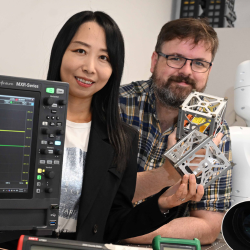-
Study
-
Undergraduate
- Search for a Course
- Undergraduate Open Day & Events
- Application Guides
- Northumbria University UCAS Exhibitions
- Foundation Years
- Undergraduate Fees & Funding
- School & College Outreach
- Continuing Professional Development
-
Postgraduate
- Postgraduate Study Degree
- Postgraduate Research Degrees
- Postgraduate Open Days and Events
- Postgraduate Fees & Funding
- Flexible Learning
- Thinking about a Masters?
- Continuing Professional Development
- Change Direction
-
Student Life
- The Hub - Student Blog
- Accommodation
- Life in Newcastle
- Support for Students
- Careers
- Information for Parents
- Students' Union
- Northumbria Sport
- Be Part of It
-
-
International
International
Northumbria’s global footprint touches every continent across the world, through our global partnerships across 17 institutions in 10 countries, to our 277,000 strong alumni community and 150 recruitment partners – we prepare our students for the challenges of tomorrow. Discover more about how to join Northumbria’s global family or our partnerships.
View our Global Footprint-
Applying to Northumbria
- European Union
- Our London Campus
- Northumbria Pathway
- International Events
- Entry Requirements and Country Representatives
- Regional Offices
-
Northumbria Language Centre
- Faculty Requirements
- Acceptable English Requirements
- Pre-sessional English Language and Study Skills
- Academic Language Skills Programmes (ALS)
-
International Fees, Funding & Scholarships
- International Undergraduate Fees
- International Undergraduate Funding
- International Masters Fees
- International Masters Funding
- International Postgraduate Research Fees
- International Postgraduate Research Funding
- International Money Matters
-
Life at Northumbria
- International student support
- Careers
-
International Mobility
- Current Northumbria Students
- Incoming Exchange Students
-
-
Business
Business
The world is changing faster than ever before. The future is there to be won by organisations who find ways to turn today's possibilities into tomorrows competitive edge. In a connected world, collaboration can be the key to success.
More on our Business Services -
Research
Research
Northumbria is a research-rich, business-focused, professional university with a global reputation for academic quality. We conduct ground-breaking research that is responsive to the science & technology, health & well being, economic and social and arts & cultural needs for the communities
Discover more about our Research -
About Us
-
About Northumbria
- Our Strategy
- Our Staff
- Place and Partnerships
- Student Profiles
- Alumni Profiles
- Leadership & Governance
- Academic Departments
- University Services
- History of Northumbria
- Contact us
- Online Shop
-
-
Alumni
Alumni
Northumbria University is renowned for the calibre of its business-ready graduates. Our alumni network has over 244,000 graduates based in 178 countries worldwide in a range of sectors, our alumni are making a real impact on the world.
Our Alumni - Work For Us
What will I learn on this module?
The module provides you with the opportunity to develop your skills and knowledge of cyber security through the examination of the principles, theories, technical skills and research issues associated with the disciplines of ethical hacking and computer security.
The module develops technical aspects of the subject with particular reference to enhancing computer and network security. You will have the opportunity to practice techniques and tools associated with penetration testing and evaluate a range of threats, including the use of various hacking tools and techniques over a variety of operating systems and platforms. You will also have the opportunity to develop their research skills in designing and evaluating security vulnerabilities and countermeasures.
How will I learn on this module?
Learning and teaching will take place through a variety of mechanisms, including lectures, seminars, practical sessions, research into current developments and a case studies. The subject of cyber security is continuously developing, evolving and changing and as a result you will be expected to keep up to date with developments through independent research.
How will I be supported academically on this module?
Support will come from laborarory sessions and lectures, there will also be opporunities for the distribution of information of the latest events in the world of cyber security. This will generally take the form of demonstrations or discussions around techilogical vulnerabilities, current vulnerability exploits and security breaches in the media.
What will I be expected to read on this module?
All modules at Northumbria include a range of reading materials that students are expected to engage with. Online reading lists (provided after enrolment) give you access to your reading material for your modules. The Library works in partnership with your module tutors to ensure you have access to the material that you need.
What will I be expected to achieve?
Knowledge & Understanding:
1. Assess computer systems, information systems and networks to identify their vulnerabilities and weaknesses so as to be able to penetrate those systems or networks
Intellectual / Professional skills & abilities:
2. Evaluate the principles of ethical hacking and appreciate where and in what situations these principles should be applied
3. Appreciate how the core concepts, knowledge and practice of computer security have developed through research
Personal Values Attributes (Global / Cultural awareness, Ethics, Curiosity) (PVA):
4. Appreciate the legal and ethical issues associated with ethical hacking
How will I be assessed?
Summative assessment will be by a research report (8 pages long IEEE format) (assessing all module learning outcomes), it will be based on a case study selected by you (possible research areas will be provided), the case study will involve the application of ethical hacking tools and techniques and an evaluation of the vulnerabilities and the production of countermeasure designs.
The feedback will be in the form of either anotated scripts or a lab feedback sesion.
Pre-requisite(s)
None
Co-requisite(s)
None
Module abstract
*TBA
Course info
UCAS Code GF44
Credits 20
Level of Study Undergraduate
Mode of Study 3 years Full Time or 4 years with a placement (sandwich)/study abroad
Department Computer and Information Sciences
Location City Campus, Northumbria University
City Newcastle
All information is accurate at the time of sharing.
Full time Courses are primarily delivered via on-campus face to face learning but could include elements of online learning. Most courses run as planned and as promoted on our website and via our marketing materials, but if there are any substantial changes (as determined by the Competition and Markets Authority) to a course or there is the potential that course may be withdrawn, we will notify all affected applicants as soon as possible with advice and guidance regarding their options. It is also important to be aware that optional modules listed on course pages may be subject to change depending on uptake numbers each year.
Contact time is subject to increase or decrease in line with possible restrictions imposed by the government or the University in the interest of maintaining the health and safety and wellbeing of students, staff, and visitors if this is deemed necessary in future.
Useful Links
Find out about our distinctive approach at
www.northumbria.ac.uk/exp
Admissions Terms and Conditions
northumbria.ac.uk/terms
Fees and Funding
northumbria.ac.uk/fees
Admissions Policy
northumbria.ac.uk/adpolicy
Admissions Complaints Policy
northumbria.ac.uk/complaints














